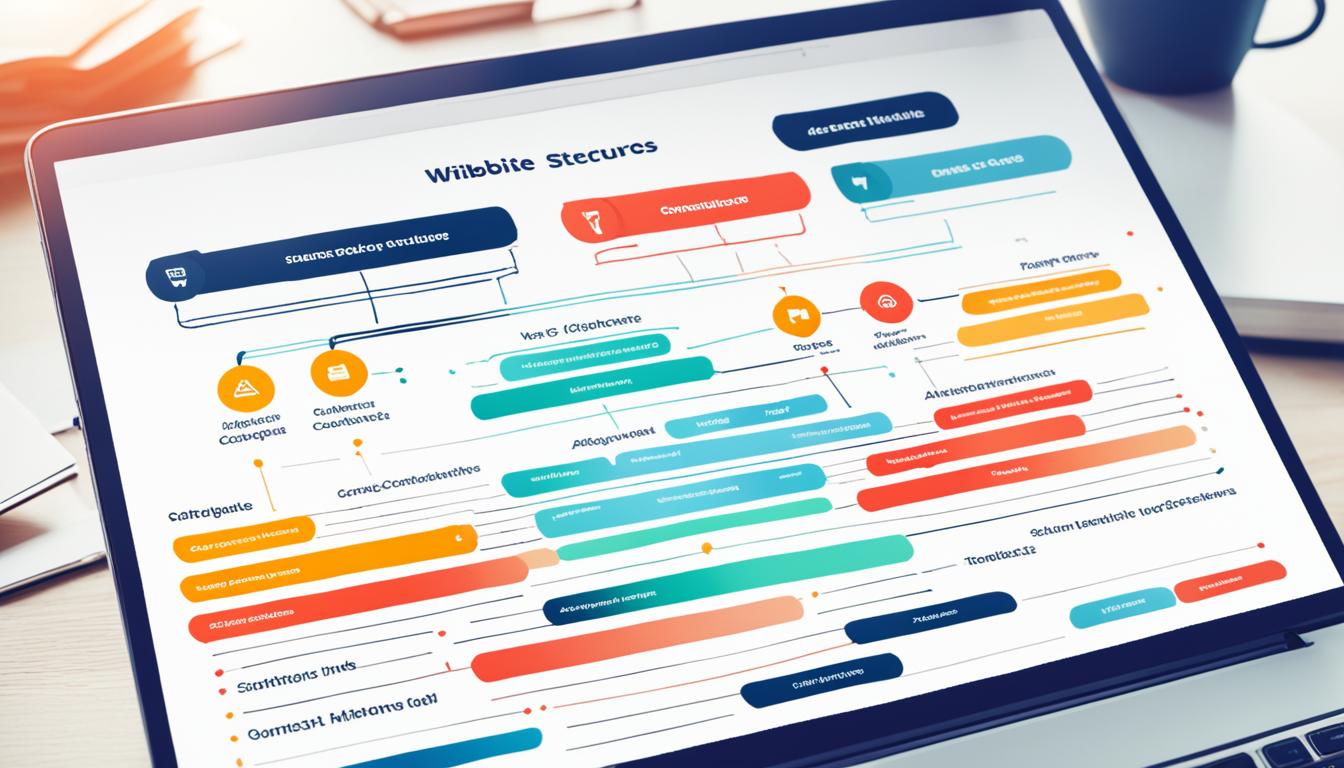Physical Address
304 North Cardinal St.
Dorchester Center, MA 02124
Physical Address
304 North Cardinal St.
Dorchester Center, MA 02124

Discover top SEO tips for affiliate marketers to boost your website's visibility, drive targeted traffic, and maximize affiliate earnings through proven optimization strategies.
Did you know, up to 59% of in-store and online purchases start with Google searches? This shows why SEO is crucial for affiliate marketers. It’s key for increasing traffic and sales. Without traffic, your targeted products won’t sell. No sales mean no business at all. A good SEO strategy in affiliate marketing helps solve this. It brings steady, growing traffic to your site. Now you just have to turn these visitors into buyers.
SEO stands for search engine optimization. It’s about making online content visible in search results. Affiliate marketing SEO tweaks your pages so they show up when people look for products you offer.
Keeping a steady flow of targeted traffic is key for your affiliate marketing to succeed. Without visitors coming to your site, you won’t have anyone looking at your products. This is why tips on SEO for Affiliate Marketers are crucial for your success.
Imagine a tree falling in a quiet forest. If no one hears it, did it really fall? This idea connects to affiliate marketing. Without a steady stream of visitors, no one will see your promotions. This leads to no sales and no commission for you.
Crafting a smart SEO Tips for Affiliate Marketers plan can fix your traffic woes. By tweaking your site and content, you draw in a growing number of customers. They’re actively searching for the stuff you’re selling.
Owning the affiliate marketing SEO game means getting long-lasting traffic. Unlike paid ads that stop when money does, SEO brings steady, free traffic. This kind of traffic can lead to sales and commissions for many years.
SEO stands for search engine optimization. It helps online content show up in search results without paying for ads. For affiliate marketing, SEO means adjusting pages so they can be found online. This helps when people look up products related to what you’re selling.
Search engine optimization, or SEO, makes online content visible in search results. It’s not paid visibility. It means adjusting content so search engines like Google show it to people who are looking for it.
Technical SEO is about tweaking your website for search engines to navigate it better. It’s like making sure Google can smoothly go through your site to understand what it’s about. This makes your site more likely to appear in searches. Things like how fast your site loads and its structure matter here.
On-page SEO means fixing individual pages so they place better in online searches. This includes using keywords well, creating good content, and making sure your site is easy to use. Essentially, it’s about making your specific pages ‘search-friendly’.
Off-page SEO covers everything you do outside your site to raise its profile online. This could mean getting other reputable sites to link to yours. It also includes having a strong social media presence. These efforts signal to search engines that your site is trustworthy and popular.
The battle for rankings and earnings starts early in building your affiliate website. You can get ahead in SEO even before publishing anything. How? By picking a domain name rich in keywords.
It’s vital to squeeze a niche keyword into your domain name. This makes your site more visible on search engines. It will also attract the right kind of visitors.
A long domain name, even with the best keyword, is hard to remember. Go for something that’s short and sticks in the mind. It will encourage repeat visits to your site.
Don’t make people work hard to understand your website’s name. Keep it simple and clear. This way, you make good use of everyone’s time.
Your domain name needs to be hard to forget. If it’s both full of keywords and easy to remember, more people will visit your site. They remember your domain name easily.
Stick to these rules to pick a great domain name. It will match your keyword research. Plus, it will make your affiliate website structure better. That means your site can rank higher in search results.

Your cool content doesn’t do much if no one links to it. This is why affiliate link building is important. It’s about reaching out to others. You contact website owners to see if they’ll link your content. Here’s how to do it well:
Cold emailing isn’t great and doesn’t get many positive responses. Knowing someone makes them more likely to help.
Links aren’t everything. It’s better to build solid relationships. They can lead to great things like working together and meeting others in your field.
To do outreach well, make sure your content is top-notch. If it’s not amazing, chances are your link building won’t work.
Giving something back improves your chances. You could do a link exchange or give them a valuable tool. It’s about showing you value their time too.
Some SEO strategies are always useful, even as others change. The SEO Tips for Affiliate Marketers discussed earlier offer lasting ways to boost your website’s performance. By mastering SEO and affiliate marketing, you can build successful, high-traffic websites.
Use SEO analyzing tools for a deep look into your website’s SEO and how it’s doing. Creating content that people find interesting helps lower bounce rates and improves your site’s SEO. Adding new website content regularly attracts search engines and new visitors, making a blog a great tool.
Fast-loading websites are favored, helping keep visitors interested and improving search rankings. Getting backlinks from trusted sites tells search engines your content is valuable. It’s also important to focus on affiliate link building and fine-tuning your affiliate content to draw in the right kind of visitors and boost sales.
Researching affiliate keywords helps target what potential customers look for. Structuring your affiliate website well, focusing on speed, security, and authority, helps increase your presence and reliability online.
| SEO Statistic | Value |
|---|---|
| Percentage of search results with Featured Snippets | 19% |
| Search traffic for the top-ranking page/Featured Snippet | 54.4% |
| Percentage of question-based searches with a Featured Snippet | 29% |
| Minimum search volume for high-impact keywords | 1,000 |
| Average CTR for the 4th search result | 5.5% |
Using these SEO Tips for Affiliate Marketers lets you craft a powerful affiliate marketing SEO plan. This strategy can attract long-term traffic, leads, and sales for your venture.

Not all keywords do the same job. It takes time for a person to go from someone who might buy to an actual customer. This is why keywords focus on different steps of the buying path. For quick sales, commercial intent keywords at the very end are crucial. These keywords are used by people who are looking to buy immediately.
At the bottom of the funnel, you find keywords related to products. For example, “best + product name”, or searching for the specific name of a product. Also, terms like “top + product” or “buy now” are important. Don’t forget about “near me” searches either. They are key in local affiliate keyword research. They show that people want to buy something as close as possible.
When people start looking up “best + product name” or the names of products and their categories, it shows they are ready to buy. For affiliate keyword research, these terms are like gold. They tell you someone is focused on a specific product, ready to purchase.
For local affiliate keyword research, “near me” searches are extremely important. They show that someone is looking to buy something nearby right now. This makes these searches perfect for affiliate marketing strategies.
Writing a detailed review boosts your chances of showing up on Google and other search engines. To do this, make sure you follow these tips:
Features are important, but they’re not everything. It’s crucial to show how a product benefits your readers.
Give a fair review. Highlight the product’s strengths, but also its weaknesses. This approach makes your review trustworthy.
Longer posts often rank higher. Go in-depth into the product’s features and benefits. Answer any possible question a reader might have.
You can make good affiliate SEO campaigns without starting from scratch. Check your top-performing pages using Google Analytics and other tools. Add your affiliate keywords and links to these pages. Look for keywords in your content to find new keyword opportunities.
| Successful Content Repurposing Examples | Impact |
|---|---|
| The SEO checklist repurposed into a video | Generated over 230,000 views on YouTube |
| Blog post repurposed from a video on affiliate marketing for beginners | Received an estimated 38,000 monthly search visits with over 290,000 views |
| Combined video of lessons from an SEO training course | Accumulated around 1.8 million views |
| Content repurposed into a hardcover book based on the beginner’s guide to SEO | Promotion facilitated by running a giveaway |
| Repurposed Quora answers from existing content | Led to over 2 million views |
Changing content formats helps your affiliate marketing and SEO work better. Making videos, blog posts, or slide decks from your original content can reach more people. Ahrefs and Sahil Bloom have shown this works well. They got more traffic and engagement by repurposing their content.

In the world of SaaS, a simple and effective tactic is creating a beneficial tool. Focus on your customers’ issues. By providing a solution, you make your site a go-to place. This approach not only establishes your website’s authority but also pulls in regular, natural visitors.
Start by finding a common challenge for your audience. Pick a problem that’s ongoing. It’s important the issue is not temporary. This ensures your tool remains useful over time.
After finding the customer’s issue, create a tool to fix it. If you’re not a tech expert, you can hire someone. Make sure you believe the tool can truly help your audience.
A great tool is just the beginning. You must promote it well to make your site stand out. Use social media, email, and contacts to spread the word. This will help attract visitors. Once people start talking, your tool’s success will grow on its own.

You don’t need to start everything from scratch in your affiliate marketing. You have existing content assets that can help. First, find your best pages using Google Analytics or another tool. Then, make them better by including your affiliate keywords and links.
Using what you already have is smart. It boosts your sales without much new work. Add the right keywords to your best pages. This way, more people will see and buy what you’re offering.
When updating your top pages, be smart about it. Add your affiliate keywords smoothly. Add more product info or comparisons. This makes your content better for search engines. And it helps your readers too, which could mean more sales.
Work smart by improving what you already have. This method can make your affiliate sales better. You won’t need to put in as much effort, and the results could be great.
This article shared some key affiliate SEO tactics to boost your site’s traffic and sales. By using your SEO and affiliate marketing skills together, you can make websites that keep improving in visitors and profits.
SEO Tips for Affiliate Marketers suggest picking a keyword-rich domain name, using outreach link building, and focusing on commercial intent keywords. Writing in-depth product reviews and reusing successful content can also help. All of these steps work towards better affiliate marketing SEO and on-page SEO for affiliates.
Also, creating a useful tool and making the most of what you already have can improve your site’s structure, speed, safety, and expertise. This leads to more affiliate link building chances and better affiliate content optimization. By keeping up with new trends and always improving on your affiliate keyword research and SEO tactics, your affiliate business can grow and succeed over the long run.